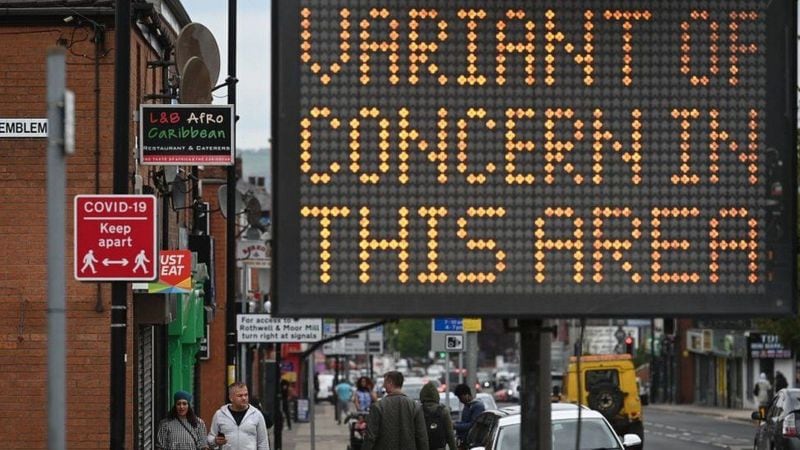India classified a new variant of coronavirus, the so-called delta plus, as “worrying”, although according to experts it is still too early to create alarm around it.
A mutation changes from being a “variant of interest” to a “variant of concern” (VOC) when it shows evidence that it meets at least one of several criteria: easy transmission, provoke a more serious illness, a reduced neutralization by antibodies or a reduction in the effectiveness of treatments and vaccines.
India’s Ministry of Health says several studies have shown that delta plus, also known as AY.1, spreads more rapidly, binds more easily to lung cells, and is potentially resistant to monoclonal antibody therapy, a potent intravenous infusion of antibodies to neutralize the virus.
It is linked to the delta, a variant already considered “worrisome” that was first identified in India last year and is believed to have driven the second deadly wave of infections in the summer.
The Health Ministry says the delta plus variant, first found in India in April, was detected in around 40 samples from six districts in three states: Maharashtra, Kerala, and Madhya Pradesh.
At least 16 of these samples were found in Maharashtra, one of the states hardest hit by the pandemic.
Delta plus has also been found in nine other countries (United States, United Kingdom, Portugal, Switzerland, Japan, Poland, Nepal, Russia, and China) compared to the highly contagious original delta strain, which has now spread to 80 countries.
Lack of data
Viruses mutate all the time, and most changes have no consequences. Some even harm the virus.
But others can make the disease more infectious or threatening, and these mutations tend to dominate.
On this in particular, the main virologists have questioned it being classified as “worrying”, arguing that even there is no data that prove that the variant is more infectious or leads to a more serious disease compared to others.
“There is no information yet to support the claim that this is a worrisome variant,” said Gagandeep Kang, a virologist and the first Indian woman to be elected to the Royal Society of London.
“You need biological and clinical information to consider if it really is a variant of concern.”
This means that India needs more data to determine whether the variant is neutralized by antibodies generated by available vaccines or by infection with another variant of the coronavirus.

The delta variant is now predominant in the UK.
In addition, much more information is required about increased transmissibility, diagnostic failures (routine tests do not detect the variant) as well as to assess whether the variant is causing more serious disease.
“You need to study hundreds of patients with this condition from this variant and find out if they are at higher risk for more serious disease than with the previous variant,” Kang said.
Slight advantage
The delta plus variant contains a additional mutation called K417N in the coronavirus spike protein, which has been found in beta and gamma variants, first detected in South Africa and Brazil, respectively (Beta was linked to increased hospitalizations and deaths during the first wave of infections in South Africa, while gamma was estimated to be highly transmissible).
Even with 166 examples of delta plus shared on GISAID, a global open-exchange database, “we don’t have much reason to believe this is more dangerous than the original delta,” said Jeremy Kamil, virologist at the Center for Health Sciences. from Louisiana State University in Shreveport, USA.
“The Delta plus could have a slight advantage when it comes to infecting and spreading between people who were previously infected during the pandemic or who have a weak or incomplete immunity provided by the vaccine, “Kamil tells the BBC.

The delta variant, first identified in India, is highly contagious.
“I would stay calm. I don’t think India or anyone else in the world has published or accumulated enough data to distinguish the risk of the so-called delta plus as more dangerous or worrisome than the original delta variant.”
Nothing unusual
Anurag Agarwal, director of the Institute for Genomics and Integrative Biology CSIR (IGIB) in New Delhi, one of 28 Indian laboratories involved in genome sequencing, said that “all lineages of the Delta variant are worrisome variants”, so there was nothing unusual about labeling delta plus as such.
“We don’t have any indicators that show delta plus should be causing public health concern or panic. We don’t see anything worrisome yet. We are carefully monitoring it and strengthening all public health measures, “he said.
Kamil said the Indian government “would rather overreact now than appear unconcerned later, as was the case with the delta variant.”
Most scientists agree that India failed to sequence enough samples for the variant that had caused a second massive spike in covid infections in India in April and May.
“I am not too worried. But it is correct to keep an eye on the variant”.

:quality(75)/cloudfront-us-east-1.images.arcpublishing.com/elcomercio/AGG6MITSTFARFBTUFOMJ7QHWD4.jpg)